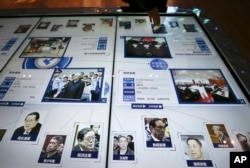A study released this week shows corruption remains a big issue in East Asia.
The group Transparency International spoke with more than 20,000 people about their recent experiences with corruption in 16 Asian and Pacific countries.
The study finds that about 900 million people in 16 Asia-Pacific countries have made an illegal payment to a government official to receive services.
The group talked to 22,000 people between July 2015 and January 2017. About a third of those asked said they had paid a bribe in the last year.
The study found that police are the most likely officials to demand an illegal payment.
About 20 percent of those asked said they believed corruption had lessened. Forty percent said they believed it had worsened.
In China, almost three-quarters of those asked said corruption had worsened since the last Transparency International report on corruption in the Asia-Pacific was released in 2013.
Rukshana Nanayakkara works for the group in Singapore. He spoke to VOA this week about the report.
“A lot of people still don’t trust their government when it comes to fighting corruption.”
Nanayakkara says people in seven countries pay the most bribes.
“India, Vietnam, Pakistan, Cambodia, Myanmar, Malaysia and China as well have very high bribe-paying rates.”
Of those seven countries, he says one is clearly the worst.
“India and their government -- again, which came (into office) on an anti-corruption platform -- is doing very, very poorly in their fight against corruption. More than 65 percent of the people in India have to pay bribes in accessing public services. Anybody who lives in India wouldn’t take it as a surprise -- it’s a day-to-day reality of a lot of people. This is the same problem in Vietnam.”
Nanayakkara says the study found that some nations, including Australia, do not have a corruption problem.
“Japan, South Korea and Thailand -- they all have (a) very low bribe-paying culture in the countries.”
The group says corruption lessens the amount of food that people eat and prevents people from getting educated and receiving health care. It called on governments preparing their U.N. Sustainable Development Goals for 2030 to include anti-corruption targets along with a reduction in poverty and hunger and improvements in education and health care.
I’m Anne Ball.
VOA Correspondent Victor Beattie reported this story from Washington. John Smith adapted the story for Learning English. George Grow was the editor.
We want to hear from you. Write to us in the Comments Section, or visit our Facebook page.
________________________________________________________________
Words in This Story
bribe – n. something valuable (such as money) that is given in order to get someone to do something
platform – n. the official beliefs and goals of a political party or candidate
access – v. to be able to use, enter or get near (something)






